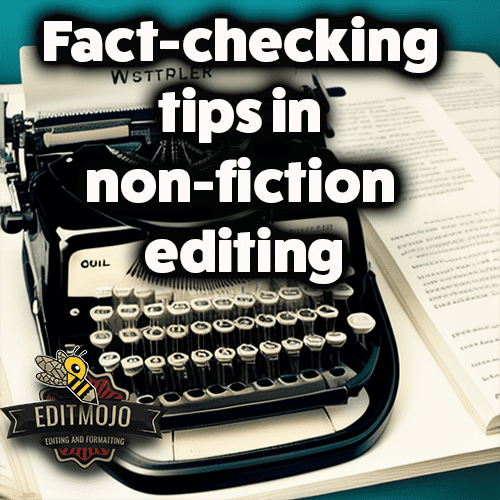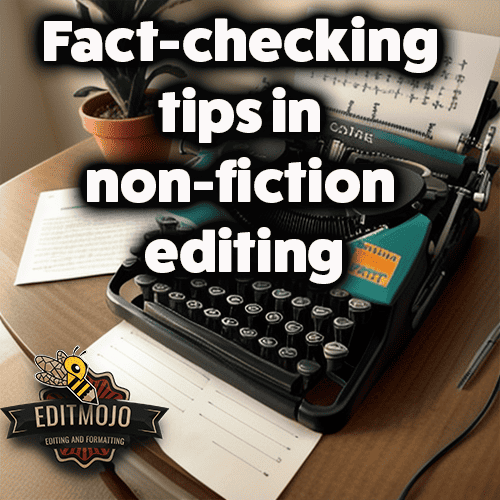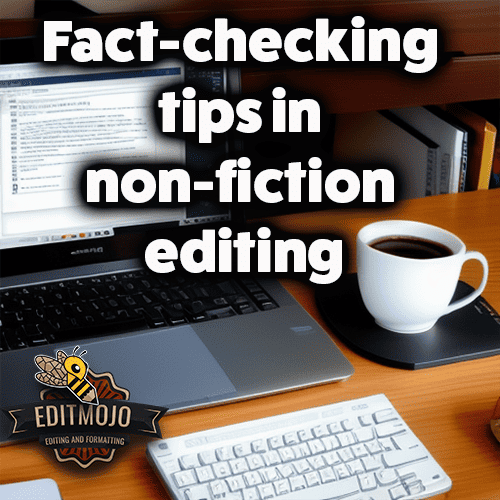Fact-checking tips in non-fiction editing
Fact-checking tips in non-fiction editing. One aspect stands out as a cornerstone of credibility and accuracy: fact-checking. This process, often seen as the unsung hero of publishing, ensures that the information presented to readers is not only engaging but also, and more importantly, true. As we delve into the world of fact-checking, we’ll explore its importance, the process, the responsibilities involved, and the cost of getting it wrong. We’ll also provide practical tips and resources to help you navigate this critical aspect of non-fiction editing.
Key Takeaways (Fact-checking tips in non-fiction editing)
| Section | Key Takeaway |
|---|---|
| Understanding Fact-Checking | Fact-checking is a crucial process in non-fiction editing that verifies the accuracy of information. |
| The Process of Fact-Checking | Fact-checking involves reading for accuracy, researching facts, assessing sources, checking quotations, and avoiding plagiarism. |
| Challenges in Fact-Checking | Fact-checking can be difficult due to the sheer volume of information, risk of misinterpretation, and the dilemma of subjective truths. |
| The Responsibility of Fact-Checking | Fact-checking is a shared responsibility among authors, publishers, and editors. |
| The Cost of Fact-Checking | While fact-checking can be costly, the consequences of not fact-checking can be far more damaging. |
| Fact-Checking in the Publishing Industry | There is a need for industry standards in fact-checking to ensure accuracy and credibility in non-fiction writing. |
| Tips for Effective Fact-Checking | Efficient fact-checking can be achieved through strategic approaches and the use of various tools and resources. |
Non-fiction editing, one aspect stands out as a cornerstone of credibility and accuracy: fact-checking. This process, often seen as the unsung hero of publishing, ensures that the information presented to readers is not only engaging but also, and more importantly, true.

Fact-checking is a crucial process in non-fiction editing that verifies the accuracy of information. It involves reading for accuracy, researching facts, assessing sources, checking quotations, and avoiding plagiarism. However, fact-checking can be difficult due to the sheer volume of information, risk of misinterpretation, and the dilemma of subjective truths.
Fact-checking is a shared responsibility among authors, publishers, and editors. While fact-checking can be costly, the consequences of not fact-checking can be far more damaging. In the publishing industry, there is a need for industry standards in fact-checking to ensure accuracy and credibility in non-fiction writing.
Efficient fact-checking can be achieved through strategic approaches and the use of various tools and resources. For example, Google Scholar and JSTOR are excellent resources for verifying academic facts, while tools like Grammarly can help check for plagiarism.
Top Five Questions and Answers
What is fact-checking in non-fiction editing?
- Fact-checking is the process of verifying the accuracy of information in a non-fiction piece before it’s published.
Who is responsible for fact-checking?
- Fact-checking is a shared responsibility among authors, publishers, and editors. Each has a role to play in ensuring the accuracy of the content.
Why is fact-checking important in non-fiction editing?
- Fact-checking is crucial to maintain the credibility of the content, the author, and the publisher. It ensures that the information presented to readers is accurate.
What are the challenges in fact-checking?
- Some challenges include the sheer volume of information to verify, the risk of misinterpretation, and the dilemma of subjective truths.
What are some resources for fact-checking?
- Resources for fact-checking include academic databases like Google Scholar and JSTOR, fact-checking websites like FactCheck.org, and plagiarism-checking tools like Grammarly.

Fact-Checking in the Publishing Industry
In the publishing industry, fact-checking is often seen as a luxury rather than a necessity. This perspective, however, is changing as readers become more discerning and demand accuracy in the content they consume. There is a growing call for industry standards in fact-checking to ensure accuracy and credibility in non-fiction writing.
The lack of a standardized approach to fact-checking in the publishing industry has led to inconsistencies in how facts are verified. Some publishers have in-house fact-checkers, while others rely on the authors or external fact-checking services. This lack of consistency can lead to errors slipping through the cracks and damaging the credibility of the author and the publisher.
The Cost of Fact-Checking
Fact-checking is often seen as a costly and time-consuming process. However, the cost of not fact-checking can be far more damaging. Errors in a published work can lead to loss of credibility, legal issues, and financial losses.
In the age of information, where fake news and misinformation are rampant, the importance of fact-checking cannot be overstated. It is an investment in the credibility of the author and the integrity of the work.
Tips for Effective Fact-Checking
Fact-checking doesn’t have to be a daunting task. Here are some tips to make the process more efficient:
- Start with the author: Authors should provide their sources wherever possible. This can save a lot of time in the fact-checking process.
- Use reliable sources: Not all sources are created equal. Always verify information from reliable and reputable sources.
- Use fact-checking tools: There are several tools and resources available that can help with fact-checking. Tools like Snopes, FactCheck.org, and PolitiFact can be useful in verifying political and social facts.
- Check the facts, not the interpretation: Remember, as a fact-checker, your job is to check the facts, not the author’s interpretation of the facts.

Conclusion
Fact-checking is an essential part of non-fiction editing. It ensures the accuracy and credibility of the content, protects the reputation of the author and the publisher, and respects the reader’s right to accurate information. As we move forward in the age of information, the importance of fact-checking will only continue to grow. It’s up to us, as authors, editors, and readers, to foster a culture of accuracy and truth in non-fiction writing.
